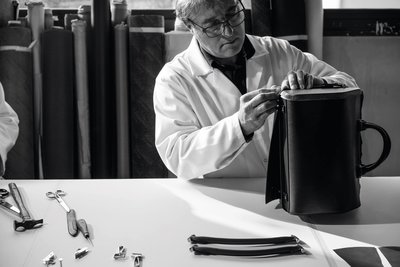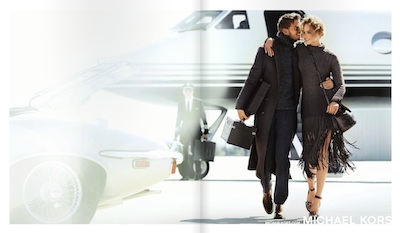The value of goods and services in the luxury sector grew about 28 percent from 2010 to 2013, according to a new report by the European Cultural and Creative Industries Alliance.
At this time, if it were to be considered a country, the luxury industry would be ranked the seventh economy in Europe and 20th globally. The luxury industry is expecting further growth, as long as policies are instituted to protect their status and facilitate trade.
"This sector shows during the years to be competitive and to be able to grow globally," said Armando Branchini, vice president of Altagamma, Milan.
The ECCIA is comprised of five luxury industry associations: Circulo Fortuny, Comité Colbert, Fondazione Altagamma, Meisterkreis and Walpole British Luxury. The ECCIA released it inaugural report in 2012. The group commissioned Frontier Economics for this report, and presented its findings to the European Commission and Parliament, who recognized the importance of implementing policies that support these industries. For the purpose of this report, high-end industries are defined as a horizontal sector including watches and jewelry, fashion, perfumes and cosmetics, accessories, leather goods, hotels and travel, gastronomy, furniture and furnishing, design household equipment, cars and yachts, wines and spirits, retail, art and antiques and publishing.
Going strong
Europe’s share of sales from high-end industries has remained steady at 70 percent from 2010 to 2013. In that same period, the value of sales rose from $531.6 billion to $679 billion, and the value of exports rose.
The luxury industry accounted for about 4 percent of Europe’s GDP in 2013. Personal luxury goods have been growing faster than the European economy as a whole.
About 1.7 million jobs are kept by the luxury sector in Europe, with 200,000 positions created since 2010. Luxury brands invest heavily in training, with an average of about $870 spent per employee, and they also expend to set up sophisticated manufacturing facilities.

Porsche Design handbag being made
Clusters of like-minded businesses, for instance watchmakers in Glasshute, Switzerland, create a knowledge-based economy. Cities with a concentration of luxury of high-cultural industries tend to have extensive retail services, telecommunications, financial services and professional assistance.
In an ECCIA statement, Michael Ward, managing director of Harrods and president of ECCIA, said, “The luxury sector is the perfect ambassador for a set of uniquely European values, such as excellence, creativity and craftsmanship. Thanks to the sector’s continued growth, we offer opportunities to young people from across Europe in what is a more complicated time economically. Our industry has grown out of the virtues of traditional craftsmanship, culture and creativity to become Europe’s Silicon Valley.”
Luxury makes economic contributions in the form of tourism and travel, support of the arts and creative industries. These brands also serve as ambassadors of European values.
According to the report, it is important for luxury to maintain its aura, since it would lower demand and therefore luxury’s contributions to the European economy.
The ECCIA is asking the European governments to help it continue on its path with selective distribution, intellectual property, access to global markets and governance of the internet.
Luxury brands feel it is important to curate relationships with their clients, by keeping their points of sale tight. Direct retail, as opposed to multi-brand and department store wholesale, is expected to increase from 31 percent in 2013 to 40 percent in 2020.

New Longchamp store on Champs Elysees
Loss or lowered ability to selectively distribute is estimated to lead to a loss of 252,000 jobs and $44.7 billion in government income, through taxes.
Legal control is also needed to combat counterfeiting, which increased 15 percent between 2010 and 2012. The European Court of Justice recently ruled that it was not the scope of EU customs authorities to seize counterfeits.
Visa policies also directly affect financials. In 2012, a visa regime is estimated to have lost 6.6 million tourists that year, who would have likely spent $621 million.
The five biggest spenders in Europe are travelers from China, Russia, the United States, Kuwait and Japan. Most of these purchases are made through tax-free shopping.

Michael Kors ad
Luxury brands also want access to global economies, through FTA negotiations with emerging markets, particularly Indonesia.
Cultural contributions
The development of high-end cultural and creative industries is important to EU citizens, 77 percent of whom say it contributes to Europe’s economy by making it more attractive.
These brands also make contributions to their home towns.
Philanthropic efforts have been enacted by many brands worldwide, but when it comes to efforts in Italy, the home country of many luxury houses, internal philanthropic works are sparse, according to an executive from Tod’s at The New York Times International Luxury Conference.
Luxury brands typically hold strong influences in their home cities and countries and can therefore present themselves as chief contenders to lead social change through philanthropy. Reaching out to foundations, historical landmarks and people in need can create a positive aura around a brand and help the brands connect with their roots and impact local communities (see story).
The ECCIA is asking for policies to allow these luxury brands to remain arbiters of European culture.
"To European and national institutions we never asked for special treatments, protection, or economic resources," Mr. Branchini said.
"On the contrary, we claim for clear regulations and simple procedures, to allow these industries to grow more and to represent the European culture, taste and point of view to the eyes of the most sophisticated consumers in the world," he said.
Final Take
Sarah Jones, editorial assistant on Luxury Daily, New York
{"ct":"fhuU4tQ\/V8WVcmUn+Wr6+7xOUionOGFLrRNOqtH2FUw0vWNrmZ17uUE0hwufaNDVKuPp8TaFZkgJc1SJ64lo3JiUsC7bouN\/V2ogl5uhyHB1KGcBLiIOpC4YzkLdDzYxZYWr9dNULqYEv1FHajscjeE8T5qOmfEgdoWEYXLvXiq60nw\/zYDF9gpug2Ovnkh2Jmvbkh8dFtUELEPIbNo0a+AAIgbU5hjwT3A8uBQAsC6ZUjSc\/djRP\/7gW5CKdetmy48sEpHcq+UE5rzOUB9MPgJbL+SeE+gRcV2Vr9n0s0MtSu6djnB7FrgKCNk06700VAm4sG\/5aFCQJjJ7qsibZmtj+Bm6MEzp9FvoGl2keDXix\/UYKQn5u\/HbbpF9q75uD+u3Fg3vu7mliudbcquCLu+dr4\/9Ax9g7GTk7yRkIz2+B4MNEqhAbVxuQwA2soCA6y61tY0d9JHkZ9GYWym+ct98onmUQcWctnOL6V92\/BSU\/XV7q554L8lBFLJ9c\/GA98TTEwi5evDccdi+7E77V4LAUMCHT5dZF6mR9xheWzHGbyKk8Q+Ajt4kamoQbuFGVr89jaX5p6bR1POJDZ2MOYIEsgL8upGTW6O5BVOvcjrwNrux4IvEySQG0wbV\/gPb4Y\/THr+pnCzlTpUl4N6ic\/vxfxhh2MKFTHjmYBN+D+s\/\/aB6085F2vQbEKXwj1r7krQ9EmAf+p5miAgTaQKpfARnmZ6pfvEmtDn1T9dhPA2xaXUDd3XINTRZZ9V1NHZutZkGHWGqt+Q5IFuWLb8PRbFX56EMIt6a4DTALaYhwk2QhmxxoymPHp+m9OWivtwsWy0K+HIqMI4W+5LDL3tEmzogQGBB7GukRGUw2PgDICL3txGh1\/V4cdr3jt7jOYFPgmecTqCOQE5LYyIo7jUmn5hEsicZKKgqyC\/hDChViSxwfWJcmDoPPA\/C3mlE++7nR5lgaLYf7t2nb2m4U6HRpA8fp+euoaFL+KvAuD3mswz95Ni0SVdzE9AZHyTx+2LQrFJB0EHv2gkJWrDbAkMgAiFL2jReBb2zLdBJvVx40K43zM+pB1yo89fr1QtvNZBTX5CVQFmBMMIksDIKYueeyQgyOXu6k0lpFiBFBQDFw+Doj2pFrNqFUFrkEUw3oPmWhxEliZyAEZq0msSlqM6mrvSnJUKiMZvQ5lQ6J1GYxkrDZ7SESophDe88IgXimBq9QYGSGI7Kul0x\/5wDMpQce9CiwChjEp7Ef37zVZkI8T+ojqhGrPJtauP2FlKXFtYhAefkJgZT9pyAj47cKr2Ky7ryPQ4MIUnJ\/KgBSBjsx\/\/IHIOMktbm\/mruvOifyKvo+9YsfGky2dn28vH7IrwsC7Ds8U8cxffspthhb8Sese2oDokVmGT\/zu05gj7ZHYKtmoBb7MzL3zoyZRFB78hIO4IRrHA8ZiY\/PSL5Pm9HgTFP6hb96Ulmqvo3LfAOarpa4kmWTVWyIIi2Q1Eavb4aBI81dTubSlmnfmOdpiC9xMYSGGvnxaoyC99N47fwanooEVM\/UAig+1INegCPdvgozA9qnYFuN7lKLUWlXSJGs5Z+jTT7mKyLoP5UEr7wm2PkYLe\/3CtQu0LBzCBJJNl1IlxCrP1AnfEuBWFX74gQ+wYhS7NtLStWfahdza\/TgCboHexMKbBOXs0AHAUMXj0JGfPh1X6UaltQoswrWsy6aM\/YnErQw9WY6pIvhdLik1qkQH5XTLt2zPN\/5XMDQ87RjUlqjXWnXoV573+LTmimbim8uDSAS9EPDYSDCoBItY+8l4tEUqI3NJWrlW4vFtVkUW\/JwPVixapNphDJc6NVyJiZLSdIkQVi0popYZLjEg8ux97o2u6Ollj19TajpPNDpWGiLoMOqD1Z7wXaX53sYfWgFm4xN1BmJ0H7fLN0CqO7jIeI7i8UAJCoiPv1WJI+9zdZ09NgKB8ayQtOAAmTk5z3AsRev\/nHYK3dtLwOce9mr0+c\/WFw5hgHqX\/4NNrK8cyRZwtPSQrIqS07cpYAeEPKDyYVZZP3PtEmKeJf17KddjVgUHiTkpQh3Bo3r3tswzzUP0gzZa2zUuVm\/S4JzWjRk2Ku6pvOeW1t6WdFbyJ0aoKj4\/UoOZs8r8iKUVB1B1vjNTHa1BP5IhD\/WWrGSqgTQVdKNMDy5zZBi70aeieunbeGlJ6CMnYdcez00UKfERZW7EremtzcBsAw0KMFbuPIQMrG3Wyq4ZhCFu3vDBkqrPU3PCaDIMj6UZutYNFYQhqwbE0hmie0hJip67uJWBkN\/0wyl+RKsZTPODBWux2lwyhFxZesEYnu45PMfmyxJwe7FdP7MlFhpjd\/lJefcKplNDe984x8N14aBkvb6FqpjA8WEFDHycq3XWK24ebGpqj8ziBCqC0DtjzyZRYMuDbtlYYA3BCVvjYEmvLR9NdWmPs9Q4jU8JHbft1Lm3zh+FocXTrbs\/cglOUuc1LiTZTIJfGTLqHWIg2FN1X5YjrwVQR5xN\/em44Yg2NU97Ihd5WNxC0wyamBvyC4OsQD3OkoIxl8X2X1E2oklUliFDxuuWL1K2WkCC3PYTOhUzvmp12qtPhzaqrggXj4MKe2NCmhcqT1bD0uOcPU47QRoU+t2MmT6s4D0qiIAxNwdmLX1OnJOw87QxNFQN6gNynA933iV+AZEmWp1+JcSw7hudNyWhF2AbzTzP75GDvndZtFnJKQ\/spNHrVlWgvWf72MWI1C247ZOI\/snvKjJ8ybw2nGC1Eb3bSOQDQToJxdiRRQ8WWrnPTS3uA5Dd9c6lteoPSwbBhYLBMeZin4oSLV0Vye8DgdU5NeR9MJz81lAIuc\/UCqb4LkMAuKXb+kJLCQbnL4b9t2HlDy2cRTAwRr24yLjj+v8roktzZQH1B+LO7IzBUaaemZTBEDTY5h+OaDzLc5WnIJJGE2gRimLxujM23\/u2MC6mePEssodhwyjP82MxzesmnEyrEIKHPvMHzjOZluQ5OyFgSSsGrQ\/YsjXBApKmVBeQMKLsIKDsLw2Bm0As76fqp9JUuskEHR0z0QWpQTtb3bWrnaF9sOCtddrcJg6h2umOPVLl0msYWKvLcevqNX\/cebpfn7uUomV7XGm5RUW7udaXPscvmBGUzzzWteaahrgnPgvICESoVFuUBuWYUfR0BUVU8fVkCrM5\/90sysDsfu7k0g1uwCmg4pPF7IbHgBNeifblEGwBBhsb1A1gb2ssvM\/KngXisEbB4QLtjBwEI3IHUSTp17eK0894uQdCt91aY4t35mAnjU0wl3c+b2w86hBQjj1nqCsjmF6wk1OpTAFZf\/hrWJh1Iv0asbM9Ztz\/e3wj9yjCK+IsAjKloJf66de8Xy85Qk2kt0wFjg7MgpD3ZZOZ5N5J9oOzyBhyBYBmS5XSud\/vgMfaDy7V3yAksV70D9neSiu9TrfhIOpsLHBbjF6xXdjEhI18OMOaQ6707cgwPWOPWuEbiMjpg7UHoE7JnM7jks4ZEANnPq1g2EK7IG6KdprC6OdEwNLh+MYqjaFSGTuiAo+3ELLNCUO4DzBid4q5ooh8PQcquM+vHNCBvUSYb04JpfH6fXyAf+y+69HtjZrTuAZBKeng1Y2hMxP6aseUc7sxePPDlXR\/5RRovPHDV\/v+bEfB1abOcMMYVPm+iyVJiPJOQj4sp3U1qbKIe6D\/Kgt36kbjfMvrsa0eBnsSF0aHdTmjhY60OzSLPbBda5EoXkZAakwUJsCeNMYQyqXDNUciTTIN\/D1abSbLsZU7BrNkMADe4yTyiM5+6FdfX3Dhf3hDNiN4foteV881yqbnOU8C3R3WmKAW42k2HHivLPvqngKSfHKe81Jl17ItWyvTXfCGRmDhE3gVL0szwBIAmWGeZRUuAbTJVclYbuCccZxP0iRddAUh0A2uVyiQE9TqMFJwp58VsnKuoT2TKydk74OT1Gajc4bZPptI5dVK6fAfSVH9yzTs9yQp0aof57dpGHJSSqH4GdC\/E0TVzOm7qTfhpt\/FP1ZhoGDdf2BOWxkOx5A2E3RlQ4z3tCbAQFbwil03eydHH1HilAwIYcM5v4qDhsfiqAZ+KBU8bH\/sI17a9dgx4aUypYiqkDn1QnVl795ej1G57deufSB52z4G3q20\/TrSTfRiRTIPAV6B6gHeuJZSSsj4x6DAfYDOlGatdDQAzmBcBa7ZfhiSbPjCx3O3gxdUjUKVRIT+dgbilBVvEmM5CIEVG+XJtyTdL1+tEQdiyaSPTZ4t+Rvluz54qsSA8g2BTYAa1uP2rADhZafX+457vHYFIHzcg9nJnv2zFhNN+0IeLLehET6xDen73gGuZ7FUobocw7G3TctffbRprW6UPFRRTg6PX1bbWWZpqe8tw3wTwilI4OizsriVYWZY+e+qBv0wtRID1n4KXOLaXqe0iAhnu9MIU0nyw3XvU\/TIM6mK\/6WH1CaCNqfGP0aZivnG\/I9+8+ii+menP\/ca5murjbxcMYvTUL5uwwA27C7qJ5vRE7BnYMLfmKLAGmgr5QGWT\/jweiKuXhWUX3KJWHTvEvkyfl1yUTPkUdKxn7b0z1gAZpliOGWV9wQmJuqsT8ZQWvrHZd9VogtXNf5mtbf\/9LF\/L0gYpXz9vcjQhDh1dyzWhfwUv2UnyJk8bpAGEPTJfDj0Ezb50ODNmDXRZXYdyODxpWdv1PA2qu8V7M5XfQ82YMw7j0R80wpTd9OFV1zMZk21KZErrmP9Gov3Y5JCJ3sxO9h4lB2wFGwqhdOFuK4Sn4eHpKnAc+iZEGZFq949E28w02KWGzvMsoc\/iP8PBT7K1VrHZZk7XXLLl2NK7j46yRvKyVx4GIxHwFuOlhiNouuCfM40d+L57aildD3dvXSQ6BNnwlcz2iZCVDn9SOfDiKDJXkFSmOe8LRTqJEShdPQwLi2VgUcim8pB\/ip7iBYpVg3XydeF0qD39LtstiwG+UZhiuBCJNXsqWgg8kVAfYDC99PuaVVELG6JyozalnDW2k0GNdYOBQTh2v6lZY4XPYfZj8Z9n9c7fgBrH+g6\/kgqOBm3BHwZMXU5I4X+P\/vuhg8F5hMzALzPXCYHGfN\/XZsEzaNhNg7ZStltCpIyj9Q7bnlOe3VtT\/25q47fd2mbiYZ0Hl1b4m+twOcUUZ5UWQs5gZG6HYnOPUXdD0fTE3ySayGaAgd7p1EXIB3Gra3ntiIEabngC9OKZgaU99\/q1\/PlKAA69nwxjNJNLjkTfs6dnR3iESOfvIx\/SlL9COPo1iShL4B4T9tQsu3m\/GYJtS\/AeH+7INp+apUg4NgBWdVB3YMYDLIfTqDikQRU7TWfjEJeuO\/0inKrRKt6CZMkFDLgDr2lWxQCNqBS05K0Cfl8Jzt+n\/Qf0FDcCBg4OTsBAl+dF6JqeocYNKo\/eGlaDMsQE5tWao+xDqLE6KttMFXs8PvcAR2coV75eiVxEBT7DBrf+OOcBcbCrXxeS+gbncuO24TcZ5suWtMtyILoWhzb5+YNmmPagErJp43F95bMBpJXECIeZwShFUrgCndUqh6aNAWNxAvu9EIwNJTcaiDcGp0t8u1Hxbpl\/Tcl4jepwNDNn8wkWQMKauxg72npO4nxvtBSby7MZElpj6Te+XLkf1tnSTcw7Xv7c\/R3ZqDaMwTljvti2yV\/OYcLIG0yzhSniiYaj+zA3RvHZgKUDj1dRVrvHypwnpcj5WN0I924tqseB6Hne\/ByvebWqcVku9tz2QWIA202HO8d5TxQrkYtEJtBaK98ZUbmTJEWsRtRifmwxMeVaLPbGdXjrF2Z1pv1671ZcXl5MN2r94cemI6u0qCs5nsz8rgbjvXDL\/XnOjEQcxDEgwtZWq\/T5pAXMnl+Tkn8KQnF6VJX7KO+DjXXNIJUxRwFz2z4GQh513Gy5+JJeJe\/OS0r7CsDkblkFVW0pvDbkOqtPvCxwbBSQVAd37bM66mUmO8us1wplR8L9jbZuKR8OrSgx9Yh2y+BnutWLl12yllgsRZvMBqThiJHwAsNyyjgDB61hTmMqgBUESL3qusrQSZvfnyeArvlQ8kdnF3viMT8WifYhm4sncpRRsHvhCaqQzRBM6pgLndlH\/BNJ5svT9Bbf3AKSwL4zrITr9apkyVTgmZu+fkOTGEQSCGY0KUNAhIxuU1hx+VUI7e42T+M3HbktavroB2w2f7ujPpqFGH18fF+d2U5jWvW70pRquj19jwTEY3K2w0RVlb955yqsgHqYHdVznrcSmRlIxDTuWbYNJnLPaO3CPwDZFLOHD7Cf92E0Ig6iZXljJQLjkTOgoEifyB8BB61g\/VuiXdc2myvW\/kV+XFzvJbLUroHRmqS6BW50RaM\/lGki4Pplt7JrpnC3l9ONTvlhdk3LcacbPugkVJcSSlNolGGgIZJ26x5ctumS0Qgn4AlCVPaPwhWXqR5ECnKWMhDndjE7Y46BozExib1\/xSjN+rHznRKt\/mBvFlaZ76waxh4k6J7S6H1PTKQtth5bJOF8yHzpsv8SkgdPx3Xy7kAEvUYogIAIUvOSoUaVm6+z3VmpvE0RU9XzYyUBuaDanTZYhxOchi+3zhZFzerYTX5e7Jl+FWH1JkbxBDsy1VaeLr4XdI349SB28D0rqGxvZsR8gd5O9Y1Wp4rCBCgygcwCKszAUvldpuEjTJIbDPjvwkMXiwdqxmUvo8j1rZtjPXysI3h9z0PFsqdFllf8hD1kAfp3sWuEnhh3FEid8iFDH\/pYGlGpKfLAL1H7xTOvA2fuAuhRAHG5f8yXAswuzuYl1l34pIyi484QLCwKoIUkcNnNauMWWvNfmCc4TppHvrELS1+xVbMV5uOhoqXQhnhPrs9EsEMRd\/2v+FpzWZM1Xkn4CiV7UsODD4\/yaNNxDndIgXXB+ZfZnsbdBxmm6ZAkw2sXbWJUO4E\/oAqp9gXjWBqG0wo+SykQbFnT46Uo3B6grFQ5Xw2EmYjSEiiZKmW\/MkQ3maTwp6tbntlPQ\/7m09V3d9qXra5fxEajF7BiooXv4j22A2yiATISCLuYomiqRJ3gHNrb5rCLktvqKmO0UbgKxBXtxCAgJ5b25Iei2XhDDYQJu9WdHquP2+nbLhPtHqc0rAJVN800Xmd2jcuD0v1rWT7l4uCcaShNHmjOS36cdhYKjAeuJ5eQBuJJehq8H+35nbhwN9MMMzi4xmcxZyUE2oElxgRkUhYbFib2qmCqmN2FOsYR0ntkabh+pI4y8KHJaqyWuDoN\/G244PjzdawRyA1IboZQeWHCwT1\/AXgqptFuzOXZyFsuBDXmoAARkq7l3PO4CGRgoCBpLChQ2OzLj7sb+Ve2+uLB5RGgAJwpedfNuilEmU+e8e8Z9Rrl\/t0LVqcoguU1J55dTSv+aXpwAkyG8PK4cpW40WSWhb+gSq\/Hbm9tSTx6W6RhWpmLAHh35AIpVuu+WDJA0K4KgCXLQ5JYE6o9JVHXox2kly73P74fT8yPQbGxg7HrtxwkJEs9YZieGiU0vwQlzeP8B3Y5PTtox2obsQ\/I7nGKRPX2LHZIj5Yzu2yW3M75Eqjb3kk15P1JPD\/GU63eHDgkLrmkpiEDQPbSOaj4GR2eSGJZ3xCYv8PgR6Sk0\/l+zrR\/sGpUKYF95e52MFm+P1phlqbo8DytsZolf1HbcazsuuW0nIf\/Cixg2ChhxBtnXbzqBr4W+gd5eHuIagWQC6xxjJff8DnLi4yxPJdyfe2BZu1dF90jCvoqLlo4LW9vlycW2bZtGWZC6ehhZG8w7QMjV3CMP2HvhmHmb6rXXmEk2\/OiM1m8fK\/nQiLmhvzqPm9B6YV9YoyC4SKE8r3Jz7MX3q5J1Zxb15fJifyERCKNWgowqpMjY2+4VyH9hJ4h8gRjvHnKuH3JSsYqRpM3MPcXp9ffqofk0b65nOpJ1K0gfqPwqV4DSO3XYTzYI0FZx5T1kzlywZUH2wjO4Je3GQtdm+rbK5cRfKpmup9CDlGGJRKJMo7kQ22HvzidfLVTD5ohTwcK2Tdk\/omTNsWuQMPBayoZr1wNDfZImumydMwSUNV9avPDkObOl00FSkGiF6e5kYQ1lEJedgOtkEjHFM1IWC1ZLnbHy6O9yaK4TGqhtbIKapdc+ovqYcwE85yvkZW2zVO\/opjjJ\/BHEWk2zZacP7qH6SxU0ohjdaMEkz6CcPPhneil2+DKHq33eVJRz7TWLkLOpIsDSCu93Pz3rTUjyTq\/fBH2euDyWEXqNsWeKlZPh9Y\/Y5vRO6wYxxlNW9GR5v9Eis3pIW54DPXChI3N04xWi9HcqA3JLKktBdolhsqi2N09WlyDk5Xwhfjae7VaqT73XQv4t3rRh+9bKfs6ELbp7YCsI66ztxtfbsOdudQNGHjaLTJ8xuQB0vi382ZBywUZg7vZ73S5H+Mz4xlXrss+7ZqMYVGIdufQH6zKmIDSZfYsBoL+BMbbTXOohMwErWHwa6fw3+dNGipTuDPUn3w9vHSZg88IZ8fsS\/xMycfXW6uoxk8I4nijqKdHPzNhT7WMzXJx77UjVO6e3EzFtLc+kdnJHZpY82uHn9sUJPMw\/XfZAJwOUKL0WgXDRQibMFUZLXqYBPqeC\/XINDgTD5712YztL+6QBdvjJ3HdvW8Y9WMgOp7nmxXRzUtlUtpU1HPfQ7pyfpwdfnW0eZF5S9t8cElV4eEJN+x\/xB3PfF2Ec6lodM4qnhZI+MAU7UrJSSt+3l3WBLmEVzDTOjukUuE4IskpwPM8JUqkBo16ZCWGOxn+FbGAC3XsYrlhdv57GvF0OA+LjwPlyht852bbxBMhRaGKJ2wmcXwY2elXKPEYEPa60ShkwdXD7LlhfBSYg2gIcnOvHenFgcQ\/FxuFdKc+e0\/IsKjm68yBhyvpxfjI4N2oocM\/2dD71oq9mevEFkL+YQ6DSjgWvIS6SEIT3DahYwYuc3OosJfxJ+DGEWbGLMna+wfrn50y62Zx0fn6sE\/v2spgpXVK5RrAe6HY\/XZvztOVjVv+B04pTywgwHdaVb770C9T4OonjnEYIFU0nzDrArPGHMjE1sZrIIG+UJmAlFwParFONZlSZaQHBtnwT5DrGseS9iIQ4tEJjhGNzcfIPJHX+aEwGVEb8MJVAKr+XKnMuE\/5HOY4jqP4E7iwCunG3ex3YNtb47d7STKZfWtS4Nr9E1NlYzgIQKstzGJWE4L8ZgWrgVjSabzCCKD03Lnj+hBWCMFoktLz13XaMzLOIbqKFEv3pACmPwTeiZRz6SWM05DXF47LBDJKIhnNRRAhYJ3CEKCTxCEIixJ0KqctRAiKOwUJAY2b4sGWZHtqklvmyqg8nQBesNBlTbnccOnmHonVTzu6DyypW3RVXYz0pPKb9ZAk19HAaOgDwpoAVoUHimRYykFVhoZbkb9fbnMmsl6vOMKurxbgFYYsgJdd9Phw5x+6cQ3NjJvAegENAobv6HSMNRwEkeRHRggsE+zFVkL4j\/JvPUxweFYEt4oCdhZV5NzZahku2NKlFUFNXhy2AnT4WZz84J7ciyOiPpRe4giL4CbtibNXe+OpslhwJOvzU3L\/Hr1kaCmtzmh6QPuyG2Ka1h+mVqleJ3pGSTSOkSPoioW6l8dDHnaKUUrv0ZnonLC7UHXSb7TZaJu7WISNmZJIy8dDvrRuTNpGlKZkQXZVwtRx7r7HIcRW2RIhA1OiyXpi+EeYmxu2hBsXSQ6DiMNy8ELJaX3wr\/5L\/MZgbyiFNBmNalTbMKLU4fuCcJOnfrH92qmCydM+03\/e6BxDlbhmEhv+OV9GLMKFRiS5BOgp74oMhaaogUL5Q6S3EjSQkLgMajWwehhLF8RCzn8mSvlkoiFkSeWnHIJRf\/2fS7zU41JZG6MJUXEjh+ux3F08oKkQEQ6Vbpoq08HjFHeLlnB3QI8bRN5Qy2QzLImRU6FlomAp7UdoshqFDPL7aqrVwsUTFx6fanRS\/bEpYppDS6hd3Bg8XEkFdf5+UFGrHGheVbmUz\/pVJS0AMssq9S3BTwxb8MPdFhcBkEG\/u2RdoNkAV0DT7V4RYoS0Gu7hoQu+i8pD3YVvIUb74Z\/Yc\/P+Nqibpguo99ZW0w21Qt1K\/BfZhUKVOlhMFu6etWeEpXPcqvDgOkQY6+\/EL9NBo9Vm7XS80VMfQdMYfNXVQG98sLo3EeJk9+K84W6pfxhMSRFji0dVTpshO38OUoBdGp7RubXI1WEpG2PEELhNiTln48kkEa8o2sZao4wRJ81\/Q9zCA9FXFznU1DPLN\/6VNEM3jqHFrwOoL2+VMi81gghv2ArYYR28po4Lai85X\/tYg3ufq3qEazSRGKLASQegzaK7zip4F0mxiCnRek5bkr0ybbNLIgVAs3Jq\/PX1QOS2zVpMhz3bXIPMumUW+s0Ne6PxKV+d0Kq8Jopbdo\/tWk7JMzmR56+UDhLhsP+PtDSwn\/8HYDXLsRE1KffZmQ8aPlV2VJi7uyaUpRwxZ+o5sS+m1fDs9K3\/3DONzMl42OHysIU8v8VZBTO3l2auLnu76skHp+sGc6Y0Oq89LXh3XPio6EPn3NLhUSZhRiOv+YAMOWXZ0dZuK33bSC8c=","iv":"391bfac86660bfbc201bebdb46f657aa","s":"1ec4c57222c82cb9"}

 Dior's Esprit Dior exhibit in Tokyo
Dior's Esprit Dior exhibit in Tokyo
